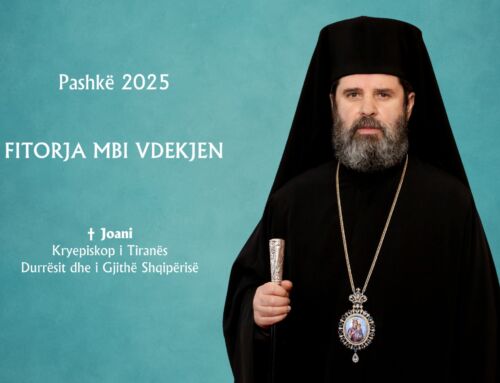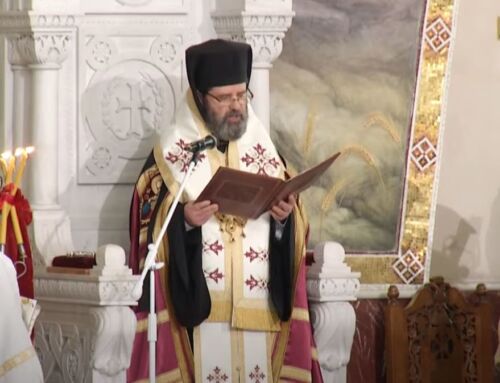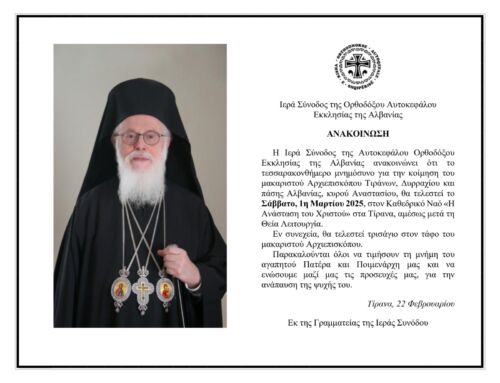Three hundred and six delegates of diverse churches in Europe were gathered in the historical city of Lyon, France, from the 15th till the 21st of July 2009, under the theme “Called to One Hope in Christ”, on the occasion of the 13th General Assembly and the fiftieth anniversary of the Conference of European Churches (CEC). A delegation from the Orthodox Autocephalous Church of Albania presided by His Beatitude Archbishop Anastasios, participated in this Assembly.
For more information http://assembly.ceceurope.org/
Called to One Hope in Christ
Sermon for the Gathering Service
15 July 2009
Sermon for the Gathering Service
15 July 2009
Archbishop Dr. Anastasios of Tirana and Albania
“You were called to the one hope that belongs to your call” (Eph. 4:4; 1:18)
1. As Christians, we dare to hope. Even in an age when millions of people all over the planet are in despair under pressure from the global economic crisis and are overwhelmed by uncertainty. Even when a variety of fears, old and new, grip our minds and hearts.
We Christians dare to hope. This hope of ours is not based on some vague optimism, but on a living Person, the real Being, in confidence and in a personal, loving relationship with Him. We have been called “in one hope” in Christ (Ephesians 4:4).
Of all the philosophical proposals or religious beliefs concerning human dignity and human future, the Christian one remains the boldest and most magnificent. It insists on the Incarnation of the Supreme Being, of God, and that we humans can progress to deification (“theosis” – becoming gods by divine grace).
According to Apostle Paul, hope “embraces divine economy entirely and answers the love of the Lord with love … Christian hope is nothing more, nor less, than the ardent desire of a love thirsting for the presence of its Lord” (Jean Duplacy, “Espérance”, Vocabulaire de Théologie Biblique, éd, du Cerf).
In order to understand “what is the hope of the call” of God, an intellectual approach is not sufficient. It is necessary, as Paul entreats, that God, “the Father of glory” will grant us “a spirit of wisdom and of revelation in the knowledge of him” (Eph. 1:17). This awareness is not acquired in discussions or through human intellectual processes. It is a gift which the “God of our Lord Jesus Christ” offers through personal communion with Him in an atmosphere of prayer, of meditative silence and common worship.
People today are generally indifferent to spiritual promises. What attracts them, as is widely acknowledged, is wealth and power in their various forms and guises. But the hope of our call is also linked to wealth – though of another quality. “Hope is a wealth that is invisible; hope is a treasure that is priceless, … this is the doorway to love, this quashes desperation”, explains Saint John of the Ladder (Scala 30, PG 88, 1157D). In his prayer, Saint Paul wonders at “what are the riches of his glorious inheritance in the saints” (Eph. 1:18). And not simply riches, but also power. Inconceivable power, with unique energy: “And what is the immeasurable greatness of his power in us who believe, according to the working of his great might” (1:19). This is an energy which has already been diffused and is acting in global history. Because the risen Christ is now “above all rule and authority and power and dominion, … not only in this age but also in that which is to come” (1:21).
The core of our hope is founded unshakeably on this truth. Christian hope continuously reveals possibilities inaccessible to ordinary reason and experience. In the midst of insoluble problems, tribulations and sorrows, we, the faithful, not only dare to hope, but “we rejoice in our hope of sharing the glory of God”. [In the original Greek: kavchometha (καυχώμεθα): we boast of, we glory in]. “More than that, we rejoice in our sufferings, knowing that suffering produces endurance, and endurance produces character, and character produces hope, and hope does not disappoint us” (Rom. 5:2-3). Hope in Christ is interwoven with peaceful joy. “Rejoice in your hope”, urges Saint Paul (Rom. 12, 12). And St Basil the Great asserts: “Hope is what makes joy co-tenant in the soul of the one who excels” (Hom. 4;3, PG 31.234c). Without ignoring harsh reality, our hope has the power to change the most tragic of circumstances with joy. “For hope in God transforms all things”, St John Chrysostom assures us (Ex. In Ps. 10, Gaume 5,43).
Our hope in Christ incorporates our daily routine into an incomparably broader horizon, into the “eschatological perspective”. Its vision embraces all things in space and time. Like a spiritual telescope, it extends our gaze to the vastness of time. Our salvation is linked with this hope. “For in this hope we were saved. Now hope that is seen is not hope. For who hopes for what he sees? But if we hope for what we do not see, we wait for it with patience”. (Rom. 8:24-25; see also I Pe. 1:3-5). If this eschatological dimension is removed from Christian faith, as some people have tried to do, the hope of our call loses its power, its riches and its multi-faceted energy.
The clear promises of God are “a strong encouragement to seize the hope before us. We have this hope as a sure and steadfast anchor of the soul” (Heb 6:18-19). This protects us in the midst of the storms; it is a precious gift for our calm stay in the various spiritual harbours (even this Assembly), during our long journey towards our final destination, the Kingdom of Heaven.
2. There is, however, another aspect which must be investigated at our Assembly. This one hope of our call in Christ is not an individual matter. It is actualized in the Church: “And he has put all things under his feet and has made him the head over all things for the church, which is his body” (Eph. 1:23). There is no individual Christian piety, isolated from the Church of Christ, from the communion of love with the Triune God and the members of the ecclesiastical body. Whoever lives essentially as a cell in His Body feels connected to all humankind and to the whole of creation. Such a person encloses within himself/herself all things and all people and embraces them with love, because the Church is “the fullness of him who fills all in all” (Eph. 1:23).
The hope of our call in Christ does not make us romantic visionaries of an ill-defined future. Hope, accompanied by unshakable faith and unfeigned love, activates all the gifts our God has given us for a creative presence in the events of history in word and deed.
I remember the decade of the 1990’s in Albania. Churches, monasteries and ecclesial structures all lay in ruins after 23 years of total atheist persecution. Spiritually it was like a desert landscape, disheartening. The only thing that supported the efforts to reconstitute the Church was a phrase that epitomized all our certainty: in Christ there is hope! We dare to hope. And the “God of hope”, the God of surprises, has vouchsafed us many such surprises and blessings, despite enormous difficulties.
In the new phase of world history, as well as in the context of globalization, we Christians are called to personally live the “hope within us” and, at the same time, to offer this hope with courage wherever we abide.
Our message is: There is hope! – in our struggle for truth and justice. There is hope when we resist all forms of violence and racism, when we defend the dignity of every human person. There is hope when we insist on the obligation for unselfish solidarity between people and peoples; when we fight for unfeigned respect for the creation. In the end, with the power of the crucified and risen Christ, to whom has been given “All authority in heaven and on earth” (Mt 28:18), truth, justice and love will prevail. And life will triumph over death.
3. However, we Christians cannot make this announcement of hope persuasive, if we remain divided; or if we maintain relations that are formal, conventional and distant. What is demanded is “to lead a life worthy of the calling” to which we have been called. It is not only Paul who entreats this, but all the saints of the Church Triumphant: that we should proceed “with all lowliness and meekness, with patience, forbearing one another in love, eager to maintain the unity of the Spirit in the bond of peace” (Eph. 4:2-3). These are direct exhortations, that clearly define an attitude to life that is convincing both for those within the Church and those who are critically disposed towards it.
We have all been called to a common hope. We do not have different hopes. The multi-faceted unity of the Church has its basis and source in the three persons of the Holy Trinity (“one Spirit”, “one Lord”, “one God”) and every believer is connected with it in the “one faith”, in the “one baptism”. The Christian way of living is founded on this reality, on the life of the Holy Trinity in the Church, not on vague ideas.
At the centre of our existence, the ultimate reference point for all our expectations, inclinations and hopes is: “One God and Father of us all, who is above all and through all and in all” (Eph. 4:6). [The recent Biblical view is that this whole phrase refers to God the Father. Nevertheless, it is interesting to note that Athanasios the Great interprets it by giving it a Trinitarian sense: “Over all as Father, as the principle and source; through all through the Word; and in all in the Holy Spirit” (ad Serap. Epist. 1:28, PG 26, 596B)].
In the history of the ecumenical movement it was initially faith and then love which were deemed to be of pivotal importance. The conditions of our time force us to supplement our quest by turning our attention, our discussions and our prayer more firmly in the direction of the one hope. This does not, of course, mean abandoning what has gone before. But we should seek completeness, so that our whole effort will be a “work of faith and labour of love and steadfastness of hope in our Lord Jesus Christ” (I Thess. 1:3). Faith, hope and love are mutually inclusive and constitute an organic unity.
Brothers and sisters, allow me to summarize: the hope in Christ, to which we have been called, provides inexhaustible vigour, stamina and creativity for our everyday effort, to which each and every one of us has been called. And furthermore, it opens our hearts and minds to the end of time. Not so that we can escape into the nebulous, but so that we can face up to our daily obligations with patience, joy and serenity. So that we live the local, gazing at the universal. And that we experience every moment of time in the perspective of eternity.
This is a hope that liberates us from all forms of cowardice and fear, even the fear of death. We have been called to this one hope in Christ crucified and risen. In him all peoples hope. “May the God of hope fill you with all joy and peace in believing, so that by the power of the Holy Spirit you may abound in hope” (Rom. 15:13).
May the Lord grant us to become more fully aware of the multi-faceted dynamic of this one hope in Christ during the course of the work of this Assembly and to enjoy it all as one. And thereafter, that we carry it back with our homes, to our church communities and, more widely, to Europe and the whole world with determination and trust. Our message is clear: Even in the most difficult situations, we Christians dare to hope.








